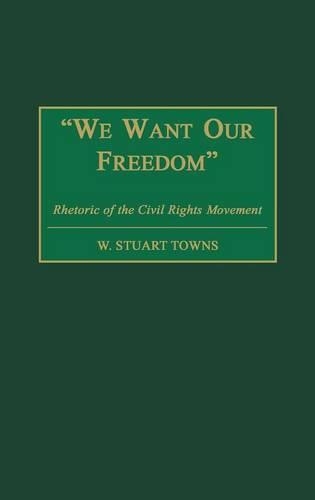
We Want Our Freedom: Rhetoric of the Civil Rights Movement
(Hardback)
Publishing Details
We Want Our Freedom: Rhetoric of the Civil Rights Movement
By (Author) W. Stuart Towns
Bloomsbury Publishing PLC
Praeger Publishers Inc
30th October 2002
United States
Classifications
Tertiary Education
Non Fiction
Civics and citizenship
Ethnic studies / Ethnicity
323.1196073
Physical Properties
Hardback
328
Description
Speeches ranging from 1872 to 1967, including many never before published on the issue of civil rights, integration, and the defense of segregation. In the decades following the Civil War, white southerners throughout the region created a system of racial segregation designed to perpetuate white supremacy, guarantee white leadership, and keep black southerners "in their place." For over half a century, this brutal, violent, and inhumane system penalized both races educationally, socially, and economically. This collection of speeches examines the conditions that made a Civil Rights Movement necessary, ranging from early supporters of civil rights for African Americans to defenders of segregation, as well as what enabled the movement to triumph. Towns includes many speeches by lesser-known persons, such as Fannie Lou Hamer and James M. Lawson Jr. After World War II, as new opportunities for education, travel, and economic growth for southerners in general and black southerners in particular, a major social movement swept the region. By the mid- to late-1960s, a significant revolution in southern folkways and culture had occurred. By 1965, southern blacks had achieved first-class citizenship under the laws of the land, in spite of the oratorical tirades and the ugly violence of southern white supremacist demagogues. The rhetoric and leadership of many black grassroots activists, along with a solid cadre of white support, created an environment in which the Civil Rights Act of 1964 and the Voting Rights Act of 1965 finally leveled the playing field.
Reviews
"In We Want Our Freedom, Stuart Towns has assembled a broad range of speeches that reflect both the passion and the determination of black activists and their white allies during the Civil Rights years. . . . Although its obvious appeal is to students of rhetoric, We Want Our Freedom will also be of great benefit to those readers interested in the black freedom struggle of the 1950s and 1960s."-John Dittmer Crandall Professor of History DePauw University
[I] highly recommend Towns's anthology. [T]owns is particularly well versed in the rhetoric of the South....[T]owns's anthology suggests the possibility that these voices may one day get the audience they deserve.-Rhetoric & Public Affairs
The speeches in this volume represent the second most important historical event that occurred in the long history of the south. The Civil Rights Movement swept the region from 1954 to 1965. The speeches collected here reflect the passion, commitment, dreams, and aspirations of both African American and white southerners who sought to refine and define the relationship between the races in the South....The volume seeks to shed light on why there had to be a Civil Rights Movement and on the conditions necessary for both black and white southerners to engage in it. Highly recommended. All levels.-Choice
"I highly recommend Towns's anthology. Towns is particularly well versed in the rhetoric of the South....Towns's anthology suggests the possibility that these voices may one day get the audience they deserve."-Rhetoric & Public Affairs
"[I] highly recommend Towns's anthology. [T]owns is particularly well versed in the rhetoric of the South....[T]owns's anthology suggests the possibility that these voices may one day get the audience they deserve."-Rhetoric & Public Affairs
"The speeches in this volume represent the second most important historical event that occurred in the long history of the south. The Civil Rights Movement swept the region from 1954 to 1965. The speeches collected here reflect the passion, commitment, dreams, and aspirations of both African American and white southerners who sought to refine and define the relationship between the races in the South....The volume seeks to shed light on why there had to be a Civil Rights Movement and on the conditions necessary for both black and white southerners to engage in it. Highly recommended. All levels."-Choice
Author Bio
W. STUART TOWNS is Professor and Chair of the Department of Communication at Appalachian State University.
